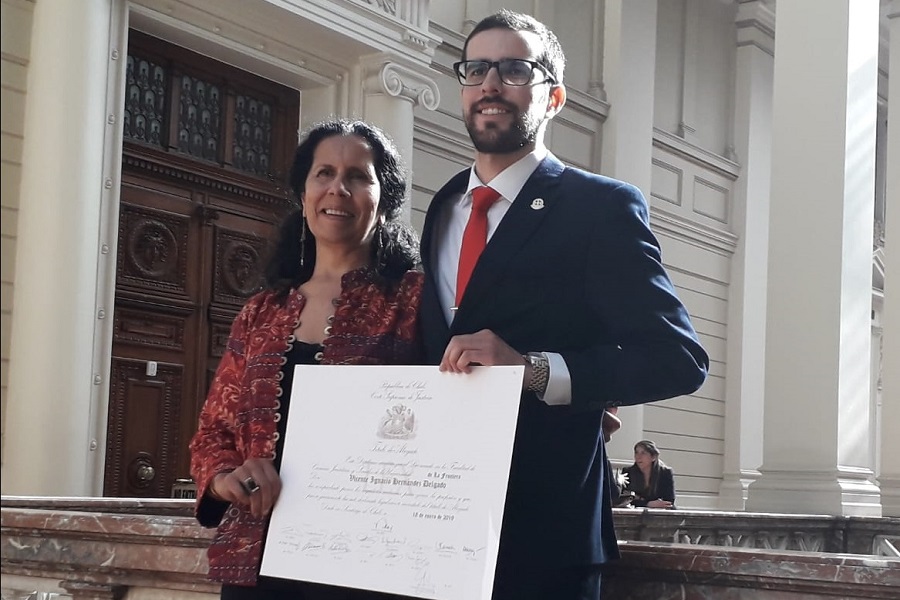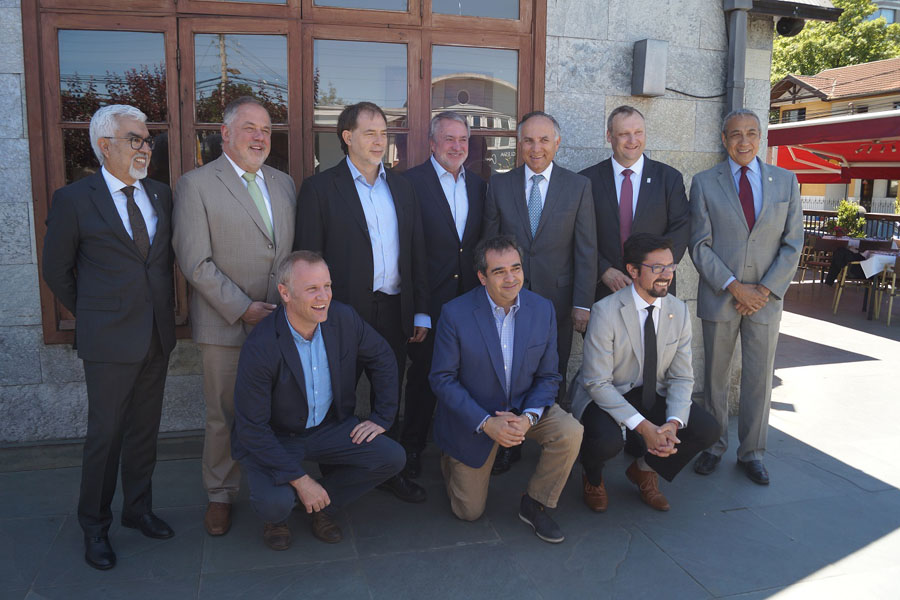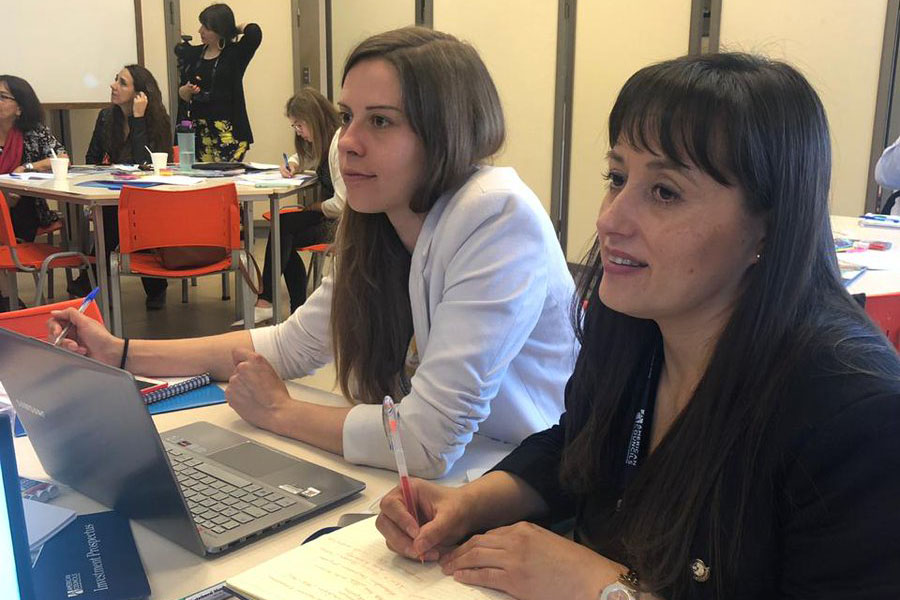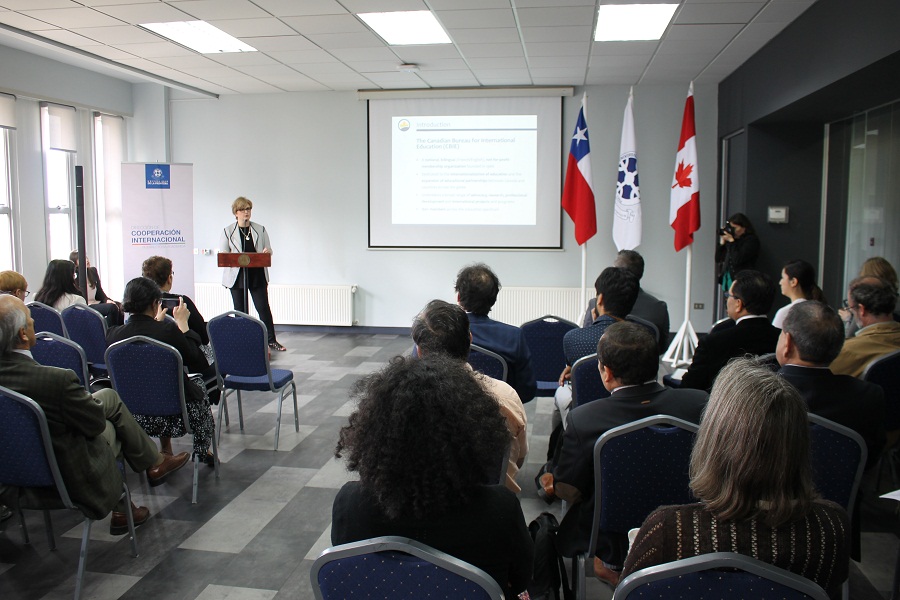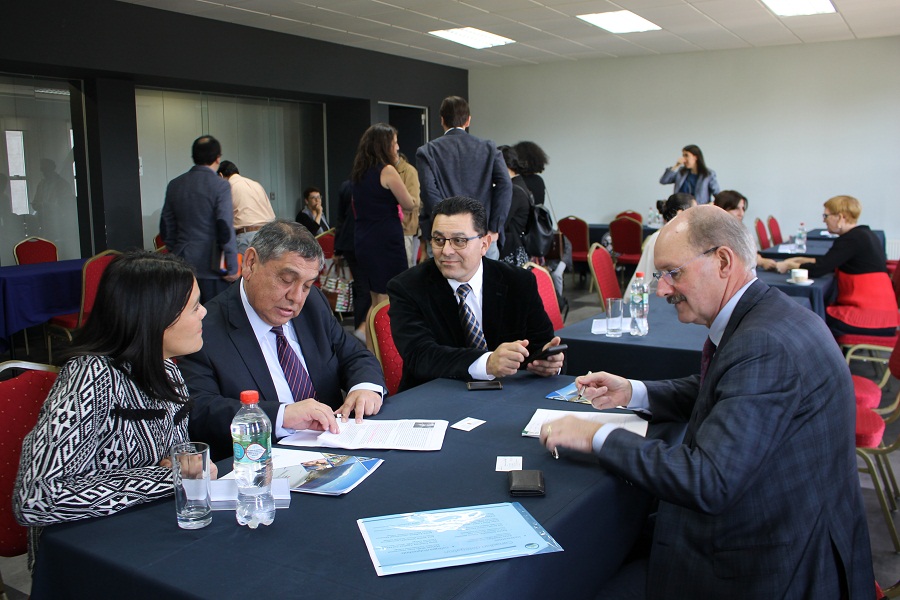|
Vicente Hernández Delgado is the face of a milestone for the Universidad de La Frontera that consolidates the history of prestige and quality in the training of professionals at the Faculty of Law and Business. |
Vicente Hernández Delgado took his oath before the Chilean Supreme Court on Friday, January 18, and became the first lawyer graduated from the Universidad de La Frontera. He was born and raised in the south of Chile in the region Aysén and entered university in 2012, enrolling in the Faculty of Law and Business (FCJE) for his professional training and comprehensive development. “This is a milestone in the history of our university, the Faculty of Law and Business and the Law School. It is a highlight for this academic flagship project in the Araucanía Region and at the national level,” Valeska Geldres, the FCJE dean, said. She also emphasized: “As the dean and in representation of the faculty community, I want to show Vicente our appreciation for his exemplary way of acting and for giving meaning to the purpose of our faculty: to train professionals who, through merit and hard work, break the cycle of inequality and provide the country and the regions with their talent while, at the same time, making their personal dreams come true by pursuing their profession.” At the institutional level, it has been seven years of work, committed to the academy, for making this success possible. We are celebrating the first law graduate, with an outstanding performance and who always was intellectually anxious and interested in the topics that concern this country.
 Written by: Karen Campos Written by: Karen CamposFaculty of Law and Business |
|
The Congress will bring world-level experts together in Temuco, on January 16, 2019. |
More than three hundred people are expected to come to Temuco to attend this year’s version of the Congress of the Future in the Araucanía Region (“Congreso Futuro Araucanía 2019”). Four world-renowned speakers will give interesting master classes in this event, which is organized by the Senate of the Republic of Chile with support of the regional universities and the municipal government, on January 16, at the La Araucanía Pavilion. The event, which will be replicated in ten regions of the country, has turned into a reference at the Latin-American level and the world-level and therefore, according to Guido Girardi, the senator and president of the Committee Challenges of the Future, it is very important that the regions can invite scientists from more advanced countries to Chile. He added: “Humanity, the citizens and politics are having a mayor challenge these days: we are illiterates regarding the irruption of technology and the ecological crisis we are living in, and that is why it is important to act. It is essential to bring politics and science together, the universities and the citizens, in order to discuss together. The Congress of the Future seeks to be a space where our intellectual leaders, our universities, which are the most important centers of thoughts, can be the main actors.” The mayor, Jorge Atton, said that this event is very important for the Araucanía Region: “The fact that the universities that have their head offices in our region are working together is very essential.” An opinion the rectors of the other universities also share. Aliro Bórquez of the Universidad Católica of Temuco affirmed: “It is very important to motivate these young people regarding research and science. We are convinced that this is the key for the development of our region. The Araucanía Region is a big natural laboratory and offers them great opportunities.” The rector of the Universidad de La Frontera, Dr. Eduardo Hebel, said: “We, the universities, have to work together on projects, from a scientific point of view. Associativity is the future of science in the future, which will hold strong results in the sense of being able to provide our regional community with the results of our research.” Teodoro Ribera is the rector of the Universidad Autónoma de Chile. He emphasized the role the senator Girardi and the mayor Atton have had regarding the needs of the Araucanía Region and the relevant topics for the future. “The university does not only train human resources, but also researches, plans and helps. This region cannot keep being involved in the conflict we are having today. We have to strengthen partnerships and fraternity. In this region, no one is dispensable. It does not matter where you come from, what matters is where you want to go. I think that this region wants peace, wants development, and that has to be a joint effort, something we build from day to day.” CONFERENCES IN TEMUCO The congress includes four conferences on volcanology, the cities of the future, and astronomy. One of the speakers is Clive Oppenheimer, a British volcanologist, professor of volcanology at the University of Cambridge, and filmmaker. His research fields are volcanic processes and dangers, and the consequences for nature and society regarding major eruptions in the past. He spent thirteen field seasons studying Mount Erebus in Antarctica. His contributions are each time more a nexus of natural science, arts and humanities. He made the film “Into the Inferno” (Netflix 2016) together with Werner Herzog. Javier Villar Ruiz will hold another conference. He is a Spanish architect, associate and Design Chief at Kengo Kuma & Associates (KKAA), with broad experience from projects in Spain, Brazil, Japan, South Korea, Belgium, Switzerland, France and Hungary. At the moment, he is working on the construction of the Olympic Stadium, which will be the venue of the Olympic Games in Tokyo in 2020. Another conference will be held by Catherine Cesarsky, a top-level advisor in astrophysics for the French Alternative Energies and Atomic Energy Commission (CEA). Among other international activities, she is Chair of the SKA board of directors, which is building the biggest radio telescope in the world to explore the universe. Her conference in Temuco will be about “The evolution of galaxies according to observations at ALMA and ESO”. And the fourth speaker is Adele Plunkett, an astronomer at Yale University. She has been working for the European Southern Observatory (ESO) and the Atacama Large Millimeter Array (ALMA) in Chile. She is a researcher at the National Radio Astronomy Observatory (NRAO) in the USA since 2018 and is working on an astronomical project at ALMA in the north of Chile. Her fields of research are star formations and her studies include the observation of young stars with radio telescopes. In the conference, she will talk about the privileges of Chile in this field and about the solar eclipses in Coquimbo and the Araucanía Region in Chile in 2019 and 2020. In parallel, there will be scientific recreational activities offered by Explora Conicyt, the Science Communication Center of the Universidad Autónoma de Chile and researchers of the Universidad Católica de Temuco. The congress will also be transmitted via online streaming by the different institutions involved.
Escrito por: Communications Team
Congreso Futuro Araucanía 2019 |
|
WorldCALL is an international association for teachers and educators interested in Computer Assisted Language Learning (CALL). |
Representatives of 37 different countries participated in the 5th WorldCALL Congress – the first one in Latin-America – at the Universidad de Concepción, Chile. The Language Coordination Center (CODI) of the Vice-rectorate for Undergraduate Affairs of the Universidad de La Frontera presented a study that describes the perception and attitude of UFRO students towards educative videos for local development in the English learning process. The coordinator of the Language Coordination Center at the UFRO, Margot Godoy, affirmed that one of the big issues for the majority of universities in Latin-America are the drop-outs and student retention regarding English courses within their training process. “We mentioned in our presentation that, among other topics, at the Universidad de La Frontera we have been able to reduce the demotivation of our students regarding the learning of the English language, since we were able to get to know their needs and interests in a study carried out in 2014. That’s how we achieved to innovate our way of teaching languages at the UFRO. We created a mini-unit for the creation of teaching material, in which we prepare educative videos for local development with the aim of confronting the students at CODI with realistic resources or situations.” “Our participation in this congress can be seen as part of the internationalization strategy of the university. Therefore, it was important to show our work, which also seemed to be attractive for several other universities, and besides, we generated a lot of networks. At the same time, while listening to other presentations, we noticed that the Universidad de La Frontera is on a world level regarding technology integration.” Margot Godoy specified that she made her presentation together with Olusiji Lasekan, a teacher at CODI, and emphasized that they also participated in the launch of the Latin-American WorldCALL, what makes them founding members of this Latin-American
Escrito por: Vice-rectorate for Undergraduate Affairs
|
|
Thanks to the inter-university project U.S. - Chile University Partnerships Program, four universities in the south of Chile are strengthening their skills regarding respective internationalization strategies. |
As a part of the U.S. - Chile University Partnerships Program, a delegation of the UFRO participated in the first session of activation and development of capabilities to achieve the internationalization of universities in the south of Chile. The director of the International Affairs Office, Dr. Pamela Leal, was the leader of the UFRO delegation that got to now the best practices to design and implement internationalization strategies with US-American institutions, presented by three outstanding expert speakers in processes of internationalization. “This is the first time that our university participates in such a workshop with professionals and academics of several fields: technology transfer, strategic planning, communications and international affairs. This helps us to reduce the natural gaps between understanding internationalization and finding ambassadors to implement the strategies inside our university with a comprehensive and transversal point of view,” Dr. Pamela Leal commented. During the three days of work, the main objective was to understand the comprehensive model of internationalization that sees this issue as a central point in the tasks of a university and wants to stop the idea of isolated silos, which is very common in the university system. “For me, the most valuable thing was to get to know the model of internationalization and its dimensions of action that invites all the members of our university community to be agents, promoters and initiators of internationalization, designing a road map that takes the best practices, the proper competencies of the institution and the questions of why to internationalize and for what, into account,” Carola Espinoza, the director of the Communications Office, said. Dr. Ricardo Herrera, the director of the Office for Institutional Analysis and Development, commented that, in his opinion, the most valuable of the workshop was to “confirm that the one-dimensional models and compartmentalization are not sufficient to show the complexity of internationalization at a university. It needs a holistic, comprehensive and systematic approach, apart from a clear policy direction in this field.” The executive director for International Projects and coordinator of the program Connecting of the Office for Innovation and Technology Transfer at the UFRO, Janina Hanswillemenke, assured: “The experience of the United States in the fields of international relations and international research provides us the opportunity to implement a comprehensive and holistic model of internationalization at our university that does not only connect the internal units that are involved in the field of internationalization, but also concentrates on the generation of strategic networks with valuable external entities, such as, for example, international universities or financial establishments.” The workshop took place from December 11 to 13, 2018, at the Universidad Católica de la Santísima Concepción in Chile, with participation of delegations of the universities Universidad Bío Bío, Universidad Austral, Universidad de La Frontera and Universidad Católica de Santa María (Peru).
Written by: Communications Office
|
|
The Canadian Bureau for International Education consists of 150 institutions for education in Canada that are part of the development of the strategy for international education in the country and that allowed the mobility of more than 35 thousand students, professionals and academics. One of the priorities in Chile was the partnership with the UFRO. |
The Chilean Council for University Rectors (CRUCH), the Canadian embassy and Temuco Univerciudad (“Univercity”) were the hosts of a delegation composed of representatives of eight Canadian universities and technical institutes who are members of the Canadian Bureau for International Education (CBIE). Within their tight agenda in Chile, and within the strategy of international education in Canada, they also visited the Universidad de La Frontera. The purpose of this visit was to generate new exploratory actions in their fields of interest and development with Chilean universities. For Dr. Pamela Leal, the director of the International Affairs Office of the Universidad de La Frontera, this is an important fact. “CRUCH asked us to organize a space for networking and to be the host of the delegation that includes prestigious universities and technical institutes from Canada. At this moment, the UFRO has several cooperation and mobility agreements with Canadian establishments, but there are also others with whom we are establishing initial approaches,” Dr. Leal said during the work sessions. The Canadian Bureau for International Education consists of 150 institutions for education in Canada – universities ranked among the top 100 by OECD, such as the McMaster University, one of the establishments with the best development and innovation in research, with a leverage of 325 million dollars per year; or other prestigious universities, such as the Queens University, the Université De Moncton, the Polytechnique Montréal, and the Durham College, that are all part of this bureau for the promotion of international education in the country. Priscila López, the coordinator of Academic Affairs at the Canadian Embassy in Chile, explained that the mission of CBIE regarding Chilean educational institutions is to “create new cooperation networks in different fields in order to promote applied research and student mobility among teachers and students. The delegation was positively surprised by the level of the Chilean universities and also by the initiatives regarding technical education in our country,” Lopez said about the CBIE that promotes the Emerging Leaders in the Americas Program (ELAP) for scholarships to study at universities of excellence in Canada each year. In this regard, Karen Dalkie, the director of International Partnerships of the CBIE, said that the bureau is interested in “exploring the cooperation possibilities with Chilean universities (…). Such as the agreement between the McMaster University and the Universidad de La Frontera in the field of medicine, regarding which we spoke with the rector, Dr. Hebel, about the possibility of doing indigenous studies, which is a very developed topic in Canada regarding good practices and assessment,” said the representative of the Canadian Bureau for International Education. Besides the UFRO, the CBIE also has existing agreements with other important Chilean universities in Valparaiso and Santiago de Chile.
Written by: Communications Office
|





